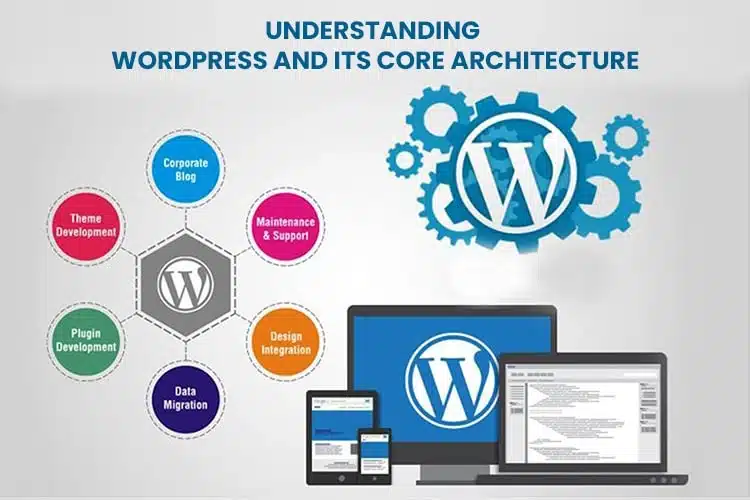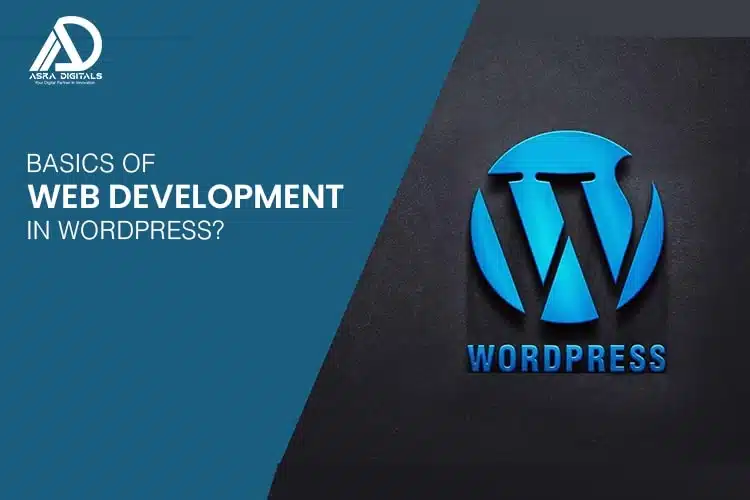Whether you’re an aspiring net developer or a DIY enthusiast growing your first internet site, WordPress gives the ability and scalability to convey your thoughts to existence. With over 43% of web sites powered by WordPress, it’s no surprise why it’s the move-to platform for novices and pro specialists alike. If you’re new to web development in WordPress improvement, you’re within the right area. This manual will stroll you through the fundamentals of the usage of WordPress, from know-how its center functions to pointers for growing robust, enticing, and rapid-loading web sites.
Understanding WordPress and Its Core Architecture

Learn how WordPress functions with its themes, plugins, database, and template hierarchy.
What Is WordPress and How Does It Work?
WordPress is a content material control gadget (CMS) designed to create and manage internet site results easily. It’s open-deliver, meaning the real code is to be had for all people to adjust, making it a versatile device for developers and non-developers alike.
WordPress operates on 3 fundamental components:
- Themes control your website’s look.
- Plugins add capability.
- The Database shops your website’s facts, including posts, settings, and person info.
WordPress.org vs. WordPress.com
A commonplace factor of misunderstanding for beginners is the difference among WordPress.Org and WordPress.Com:
- WordPress.Org is self-hosted. You’ll have full control, but you’ll need to control website hosting, subject matters, and plugins yourself.
- WordPress.Com manages hosting for you but has fewer customization options until you’re on a premium plan.
For web developers, the self-hosted route via WordPress.Org is the better choice because of its flexibility and manipulation.
Setting Up a WordPress Website From Scratch
Choose a domain, get hosting, install WordPress, pick a theme, and customize your site easily.
Choosing a Domain Name and Web Hosting
Before creating your internet site, you’ll want:
- A domain call (your website name).
- Web hosting to save and submit your files online. Hosting options include:
- Shared Hosting (value-powerful, pleasant for novices)
- VPS Hosting (scalable for growing sites)
- Dedicated Hosting (perfect for big websites)
- Cloud Hosting (flexible and dependable)
Choose a number that helps WordPress, consisting of Bluehost, SiteGround, or WP Engine.
Installing WordPress
There are primary approaches to put in WordPress.
- One-Click Installations: Available through most website hosting companies, that is the easiest choice for beginners.
- Manual Installation: Download WordPress from WordPress.Org, add it in your website hosting server, and configure it yourself.
Navigating the WordPress Dashboard
Once installed, the admin dashboard becomes your command center. From here, you can:
- Add or manage content.
- Install themes and plugins.
- Customize settings to adjust your site’s appearance and functionality.
WordPress Themes: Advanced Customization

Modify themes using child themes, custom CSS, and page builders for a unique and fully optimized design.
Free vs. Premium Themes
Themes control the layout of your website. Free issues are a very good place to begin however may additionally lack advanced customization alternatives. Premium themes for web development in wordpress , to be had through platforms like ThemeForest or Elegant Themes, offer greater flexibility and guide.
Creating a Child Theme
If you want to alter a theme without affecting its core code (allowing you to update without losing changes), build a child theme. This is a best practice for safe customizations.
Best Frameworks for Theme Development
Using frameworks like Bootstrap, Underscores, or Genesis can speed up subject matter development by providing reusable code and pre-built functionalities.
Mastering WordPress Plugins for Enhanced Functionality
Extend your website’s features with the right plugins for SEO, security, speed, and customization.
Essential Plugins for Beginners
Some must-have plugins include:
- SEO Tools: Yoast SEO or Rank Math.
- Security: Wordfence Security or Sucuri.
- Caching: WP Rocket or W3 Total Cache to boost speed.
Building Custom Plugins
If you have specific functionality in mind, you can create a custom plugin using PHP. This involves:
- Structuring your code using comments and standard practices.
- Testing in a staging environment to avoid live-site issues.
Managing Plugin Conflicts
Occasionally, plugins can conflict. Use troubleshooting steps like:
- Deactivating plugins one by one to identify the problematic one.
- Ensuring all plugins and WordPress core files are up to date.
WordPress Development With Custom Coding
Customize themes, plugins, and functionality using PHP, HTML, CSS, and JavaScript for full control and flexibility.
Introducing PHP and Template Hierarchy
PHP is the spine of web development in wordpress and controls how your internet site online dynamically shows content fabric. Familiarizing yourself with the WordPress template hierarchy is crucial even as customizing subject matter documents like `header.Personal domestic web page` or `single.Php`.
Customizing Themes With CSS, JavaScript, and functions.php
- Use CSS to style elements.
- Integrate JavaScript for dynamic functionality.
- Add unique customizations through the `functions.php` file.
Understanding Hooks (Actions & Filters)
Hooks allow you to modify default WordPress behaviors. Actions add extra functionality, while Filters manipulate existing behavior.
WordPress Page Builders vs. Custom Coding
Page builders offer easy drag-and-drop design, while custom coding provides greater flexibility and performance.
Popular Page Builders
Builders like Elementor, Divi, or Beaver Builder are ideal for quick designs without coding.
Pros and Cons of Page Builders
- Pros: User-friendly, drag-and-drop functionality.
- Cons: Can bloat site code, potentially slowing performance.
Combine page builders with best practices to maintain a fast, visually appealing website.
SEO Best Practices for WordPress Development
Optimize speed, use SEO plugins, improve content structure, and follow on-page & technical SEO strategies.
On-Page and Technical SEO
Optimize content with:
- Metadata (titles, descriptions).
- Headers (H1, H2, H3).
- Alt text for images.
Focus on technical SEO including XML sitemaps and indexing settings.
Best SEO Plugins
Compare options like:
- Yoast SEO (best for beginners).
- Rank Math (great for advanced users).
- All in One SEO (simple yet powerful).
Optimizing Website Speed
Google values fast-loading websites. Implement caching plugins, optimize images, and minimize CSS/JS files to pass Core Web Vitals.
Security and Performance Optimization in WordPress
- Use SSL certificates for encrypted site connections (`https`).
- Install security plugins like Wordfence to block malware.
- Leverage caching for site speed.
E-commerce Development With WordPress

Build and customize online stores easily using WooCommerce, secure payment gateways, and powerful plugins.
Using WooCommerce
WordPress allows e-trade shops with WooCommerce, which integrates seamlessly with existing WordPress websites.
Payment Gateway Integration
Offer a couple of charge answers together with PayPal, Stripe, or Square to optimize checkout.
Maintaining Your WordPress Website
Regular updates, backups, security checks, and performance optimizations keep your site running smoothly.
Regular Updates
Keep WordPress core files, plugins, and themes updated to enhance security.
Automating Backups
Plugins like UpdraftPlus or BackupBuddy defend your website in opposition to unintentional information loss.
Troubleshooting Errors
Diagnose and remedy troubles just like the White Screen of Death or server mistakes fast the usage of debugging gear or expert help.
Unlock Your Web Development Potential
When it comes to building websites, web development in wordpress stands proud as an effective, person-friendly platform. Whether you’re a novice or seeking to extend your skills, learning the fundamentals of WordPress improvement is a gateway to limitless possibilities. Start exploring these days, and watch your ideas come to existence!
For extra insights, take a look at out assets on WordPress.Org or download WordPress to get started out.
Frequently Asked Questions (FAQs)
Yes! With web page builders like Elementor, Divi, or Beaver Builder, you can create a custom WordPress website without coding. For advanced tweaks, fundamental HTML, CSS, or PHP facilitates.
Use a light-weight subject matter, installation caching plugins, optimize snap shots, use a CDN, minimize plugins, and clean your database frequently.
Keep WordPress updated, use strong passwords, install safety plugins, limit login attempts, permit SSL, and take normal backups.

